Sahara Journey
The Challenge
Nine men and women – Christians, Jews and Muslims from Afghanistan, Iraq, Iran, Israel, the Palestinian Authority, the former Soviet Union and the USA – came together in mind, body and spirit to cross the Sahara desert and the territories of five different countries and cultures.
The participants confronted physical and spiritual terrain that has witnessed conflict throughout the centuries. They tested themselves against the challenges of their surroundings and their own conflicting relationships.
The Route
On March 7th 2006, the participants embarked on a month-long journey from Jerusalem to Tripoli. Each of them had experienced strong traumata caused by hate, conflict and terror. How would these traumata play out under the stress of a journey, traveling 4.000 km in an old fire truck, on camel and on foot? What would be the stories these strangers would tell each other during a time that was anything but a holiday? Could they relate to each other?
The journey officially started in Jerusalem with a press conference at which Former Prime Minister Shimon Peres welcomed the team members to Israel. In the next four weeks, the team would travel from Israel to the Palestinian territories (where they met with the chief of staff of the Palestinian Authority), to Jordan and to Egypt with destination Libya.
On their way, they were accompanied by a film crew as well as by representatives from the international press. With mounting international media pressure, the team was hoping to be allowed to enter Libya. At the border, two team members where not allowed in, because they were from Israel – a state that Qaddafi's Libya did not recognize. The team decided to stay together and returned to Sinai, ending the journey on Mount Sinai, a place where Christians, Muslims and Jews all have claims. They planted „Oliver“, the olive tree they had brought from Jerusalem in a garden at the foot oft he mountain.
The documentary „The journey of an olive tree“, produced by Breaking the Ice and German director Marc Rothemund has been screened on international film festivals to critical acclaim.
The team
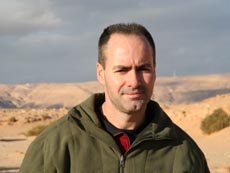
Daniel Patrick Sheridan
Born in New York City in 1961, Captain Daniel Patrick Sheridan has been a firefighter for more than 20 years. During the events of 9/11, his cocaptain was killed trying to save the lives of others. By the time Captain Sheridan reached "Ground Zero", 343 of his fellow firefighters had lost their lives in the crumbling ruins of the World Trade Center.
Captain Sheridan remains extremely angry, but retains a clear philosophy: "When you look at people in the eye and get to know one another, there is only one people." In his opinion, most Muslims in the Middle East hate Americans and he believes that much of the mistrust results from misinformation on both sides.
As a devout Catholic, Sheridan hopes one day to live in a world without hatred. He sees his participation in the Breaking the Ice peace mission as part of a healing process and would like to show the world that despite the tragedy of 9/11, people can strive for reconciliation and forgiveness.
More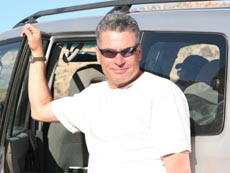
Gil Fogiel
Born in Israel in 1957, Gil Fogiel was a combat pilot in the Israeli Air Force. In 1982, his plane was shot down while flying a combat mission over Lebanon. Captured by Syrian troops, he was held as a POW for two years, spending six months of that time in solitary confinement, without daylight or contact with the outside world.
Fogiel was finally freed in a prisoner exchange arranged by the Red Cross. At first reticent to share his experiences with others, Fogiel now does so willingly, convinced that the conflict between Islam and the West constitutes a threat to world peace and that developing an understanding of the "other side" is crucial.
Fogiel currently lives in Israel with his wife and three children. He is an active pilot for El Al Israel Airlines.
More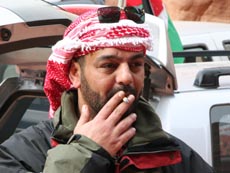
Latif Yahia
Born in Iraq in 1964, Latif Yahia was serving in the Iran-Iraq war when he was summoned to the Presidential Palace for a meeting that would forever change his life. On that day he was commanded by Saddam Hussein to become the body double for the dictator's son, Uday, to whom he bore a striking resemblance.
In the decade that followed, Yahia bore daily witness to Uday's brutally violent lifestyle, which resulted in the torture, rape and murder of thousands of innocent victims.
Yahia's journey from the heart of Arab despotism to freedom exacted a heavy price. Convinced that Hussein would ultimately kill him, Yahia managed to escape Iraq with the help of Kurdish rebels. He was handed over to American Intelligence, which offered him asylum in return for information about Hussein. Yahia turned down that offer and moved to Europe, where he survived four attempts on his life by Iraqi spies. After the fall of Hussein regime, he settled in Ireland.
More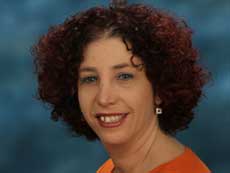
Galit Oren
Born 40 years ago in Israel, Galit Oren was raised amid a national narrative that saw Israelis as the chosen people and Palestinians as inferior and bent on the Israelis' destruction. In her home, however, Galit was taught to believe that all human beings are equal.
As a child, she had little contact with Arabs. Then, at the age of 25, Galit became a peace activist and began cultivating close ties with Palestinians. But, her renewed hope for reconciliation was shattered in 1995, when her mother was killed on a bus randomly targeted by a suicide bomber. Her Palestinian friends did not come to the funeral, for fear of Israeli retribution.
In the eleven years that have passed since that tragic event, Galit has been searching for a renewed sense of security in her hometown and nation.
Galit has conflicted views regarding the United States. While thankful for America's support of Israel, she has serious reservations about US interference in both Iraq and Afghanistan.
More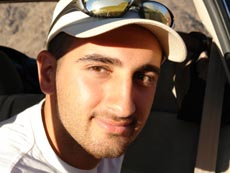
Mohammad Azzam Alarjah
Born in Saudi Arabia in 1983, Mohammad Azzam Alarjah is the son of Palestinian parents who came to the Arabian Peninsula in search of better jobs and a better life. Mohammad spent his early school years learning strict Muslim values. At the age of 12, his parents returned to Palestine with the family.
Alarjah witnessed intense suffering during the Intifada. On the first day of the Palestinian uprising, his cousin was caught in the crossfire at a military checkpoint as Palestinian teenagers and Israeli soldiers traded rocks and bullets. Because of blocked roads, help was long in coming to Alarjah's cousin. He died in Alarjah's arms shortly after reaching a hospital – an innocent victim of the Israeli-Palestinian conflict.
Alarjah believes that terrorists fight for the political rights of Palestinians and are not inherently bad people. He does not consider Palestinians to be natural religious extremists. Rather, he says, they become extreme in order to achieve political recognition.
By joining the Breaking the Ice peace mission, Alarjah hopes to bring a unique perspective to the peace process.
More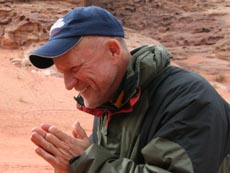
Raymond Benson
Raymond R. Benson served as a highly decorated career military officer in the United States Army for over 20 years and retired at the rank of Colonel. During his military career, he served two combat tours of duty in Vietnam as a platoon leader and as an assault helicopter pilot with the Air Cavalry. Following the war, he was posted at the U.S. Embassy in Jakarta, Indonesia and Manila, Philippines where he served as a Military Attaché and as the in-country Project Manager for several major communications projects.
Colonel Benson is a military linguist and a fluent speaker in the Indonesian language. In early 2005, he volunteered in the Tsunami relief efforts in Indonesia, offering his services to CARE International. Benson was then hired by CARE International as a consultant to review the safety and security of their extensive field operations. During his stay in Indonesia, he saw first-hand the results of the conflict between Christians and Muslims in Central Sulawesi that included shootings, bombings, beheadings of Christian school children and the burning of numerous churches and mosques.
Benson has been involved in peace discussions between Christian and Muslim groups in Central Sulawesi, where inter-religious conflict has resulted in more than 2000 deaths and the burning of numerous churches and mosques.
Ray Benson died in 2009 in a paragliding accident in Indonesia.
More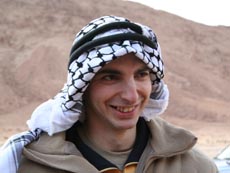
Yevgen Petrovich Kozhushko
Born in the Soviet Ukraine in 1976, Yevgen Kozhushko completed studies in the History of International Terrorism before training as a soldier in the Ukrainian army's Special Operations Division.
In 2003, Kozhushko was posted to Iraq. During his two years fighting in the war against the regime of Saddam Hussein, he earned several commendations for valour. Although he witnessed the deaths of many innocent civilians and policemen, he remains proud of his work as a soldier and believes that the West acted correctly in ousting Saddam Hussein and in continuing to act in defence of the people of Iraq.
Kozhushko sees his role as a protector of people and not as a killer, and he admires American troops for their professionalism. He currently works as a security guard in the Ukraine, but says that, if asked to, he would serve again in Iraq.
Kozhushko says, "Radical Islam is the villain, but not Islam itself." In 2000, he published a book, Modern Terrorism and has written several related articles for the Russian edition of the American Magazine "Soldiers of Fortune".
More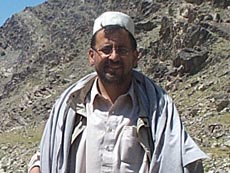
Yahia Wardak
Born in Afghanistan in 1967, as a young boy, Yahya Wardak witnessed the death of innocent victims during the Soviet invasion, including several of his relatives. To help the victims of war, Wardak decided to become a doctor and left Afghanistan to study medicine in Czechoslovakia. Although he had planned to return to his home country after his studies, the political situation there had worsened by this time and Wardark was forced to seek asylum in Germany with his father.
He was now a Muslim living in a Western country. Not allowed to leave Germany, nor work as a doctor there, Wardak concentrated his efforts on helping to push the peace process forward in Afghanistan and on creating a better understanding between the Christian and Muslim world.
In 1993, Wardak founded an organization in Germany called AFGHANIC that supports Afghan refugees and prepares development aid volunteers for missions in Afghanistan. As part of this program, he arranges "Afghanistan Weeks", where German and Afghani families spend one week together learning about one another's culture, religion, and traditions.
Wardak believes that the 9/11 attacks should be condemned, as Islam does not allow people to commit suicide nor to kill people. Fundamentalists, he says, misuse Islam the same way that the Soviet regime misused the ideology of socialism.
More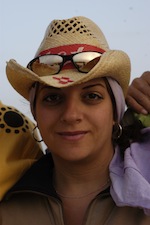
Neda Sarmast
Born in Iran in 1969, Neda Sarmast moved to the United States at the age of 9 and has traveled back and forth between the two countries ever since. She holds both Iranian and American citizenship.
During the hostage crisis of 1979, when Americans were held captive by Iranian revolutionaries, and again in 9/11, Neda was placed in a difficult situation. She was treated with suspicion by Americans and, when she travelled in Iran, she encountered deep antagonism as a Westerner.
During the Iraq-Iran War, Neda's best friend, a 16 year old girl, died of a heart attack when aircraft bombed her neighborhood in the middle of the night. Neda was an eye-witness to much of the fighting, forced to run for cover to escape fire-fights and bombardments.
Feeling that Iranians and Muslims have not been depicted honestly in the US media, Neda Sarmast recently left a prospering music career in New York to become a documentary filmmaker, embracing her passion to promote tolerance and understanding. Her first documentary film, "Nobody's Enemy", produced in conjuction with Chat the Planet, was shot in Iran and will be released later this year.
More












